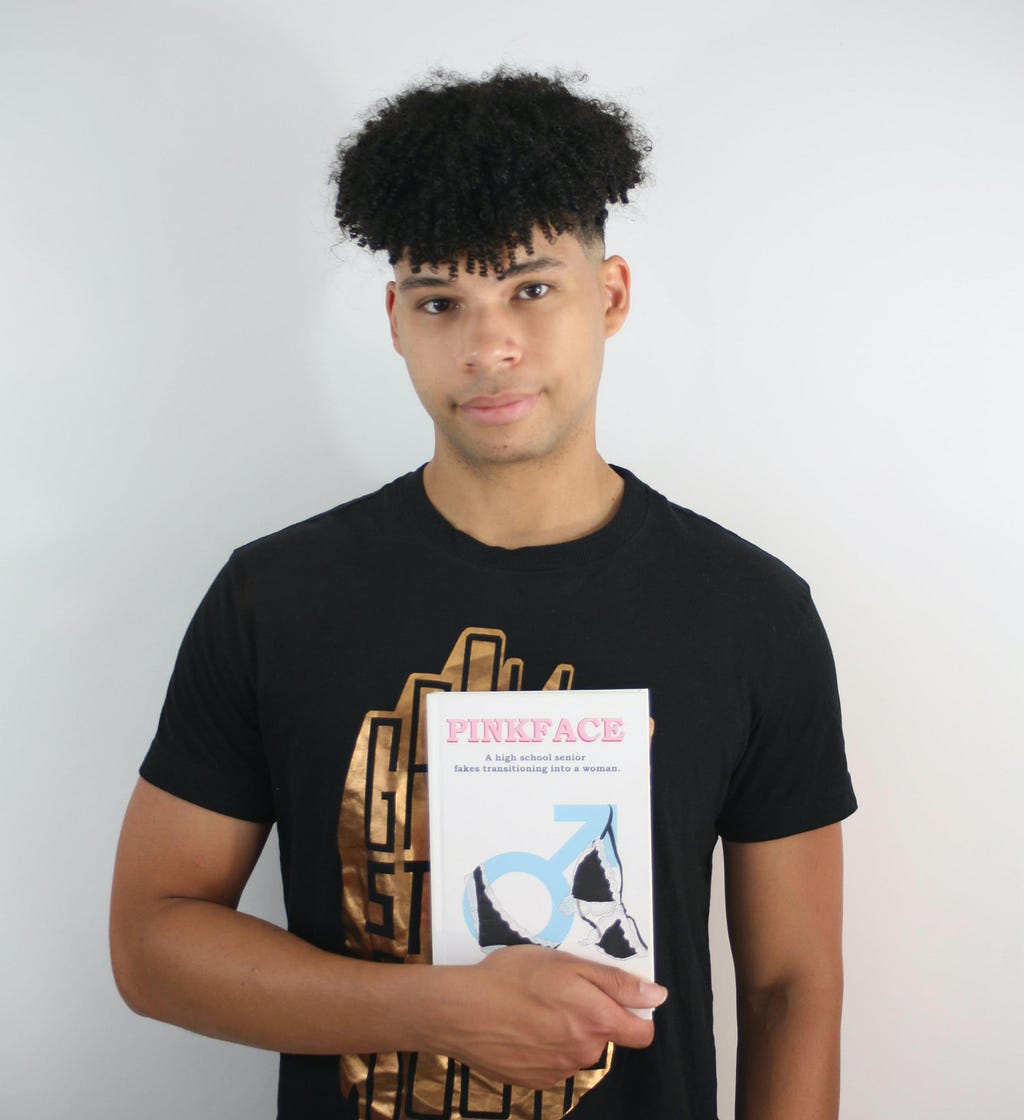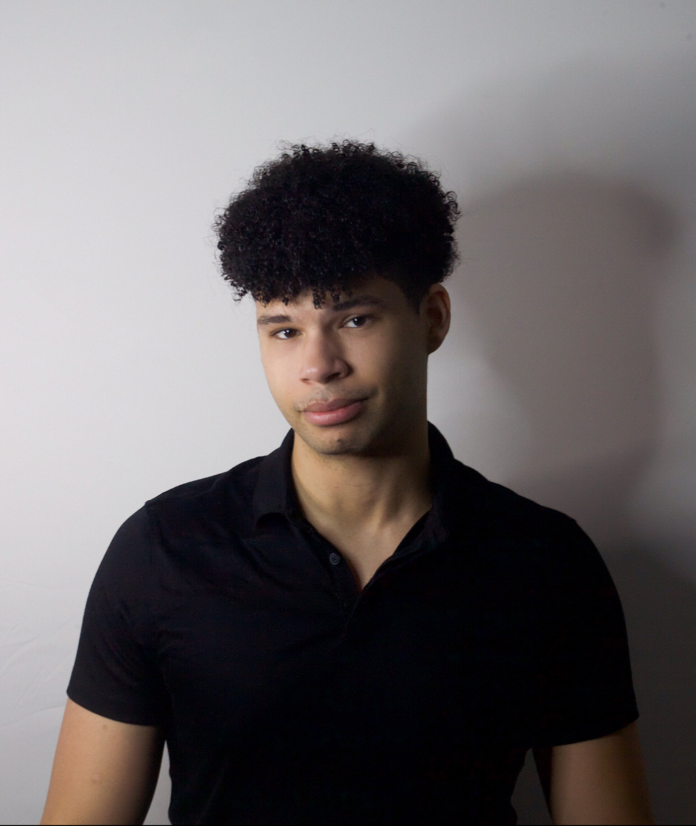Put story before yourself: So many books that deal with contemporary topics are written by people with a very clear agenda and aren’t afraid of forcing the reader to see theirs. With my book, I let go of that desire, and I am at peace with some people looking at my book with a different perspective than I perhaps intended. And that’s okay.
As part of my series about “authors who are making an important social impact”, I had the pleasure of interviewing Jordan Randall.
Jordan Randall was born and raised in Columbia, Maryland and is the author of the book Pinkface. He is musician, music producer, personal trainer, as well as marketer for various influencers and brands. When he is not focusing on work, Jordan is a MMA enthusiast, competitive Pokèmon player, and enjoys coaching kid’s soccer with his father, singing in his church’s choir, cooking and weight lifting.
Thank you so much for joining us in this interview series! Before we dive into the main focus of our interview, our readers would love to “get to know you” a bit better. Can you tell us a bit about your childhood backstory?
Born and raised in Columbia, Maryland to a black mother and white father. Growing up, my closest friends were a Danish immigrant, a middle easterner and a Hispanic. Columbia, Maryland is a place founded on the philosophies espoused in the 60’s of diversity, and everything about my upbringing reflected that. When people say “I don’t see color,” nine times out of ten, they’re trying to avoid being called a racist. The way I grew up, there was a time where I looked at people and thought absolutely nothing of their race.
When you were younger, was there a book that you read that inspired you to take action or changed your life? Can you share a story about that?
It’s interesting how sometimes the most innocuous lines can have such a profound impact on people. I was reading the Goblet of Fire, and in Dumbledore’s eulogy to Cedric Digorey he said that Cedric was “exceptionally hard working.” After reading those lines, I took a look at my life and found it wanting. That story of the professional basketball prospect doing nothing but drilling their layup for three hours straight, or the musician who practiced a solo to the point where they could do it in their sleep. I knew on some level that I had that same work ethic in me, but I hadn’t married that potential within myself to reality. Pinkface is one of my attempts to live up to that potential.
It has been said that our mistakes can be our greatest teachers. Can you share a story about the funniest mistake you made when you were first starting? Can you tell us what lesson you learned from that?
Unless you include years of posting/arguing on social media, I’ve only been a writer for fewer than nine months. I think the funniest mistake was how many literary agents I queried, expecting to get a response back in a reasonable time. I got one response back turning me down over six months after I queried them. I responded back saying “I’m sorry, it’s been months, I’m already dead!” What did I learn from that? The world works slowly, and there’s a lot of “hurry up and wait.” After querying, I realized my best course of action with this book specifically would be to self-publish.
Can you describe how you aim to make a significant social impact with your book?
It’s difficult to say the impact that I’m looking to make. Given my background, I think there are many more angles to look at the world in, which I simply am not seeing at a mainstream level. The book is a satire of course, but my main goals with the book were to tell a great story, take a snapshot in time of the post social network era, and open the public’s consciousness to a different perspective.
Can you share with us the most interesting story that you shared in your book?
I don’t know if it’s the MOST interesting, but there’s a scene where my main character is speaking to an older, less in touch senator from California for dinner. I used that scene as a medium for how I think a lot of Baby Boomers feel about teens, and how teens look at the failures of the Boomer generation. “No individual, just like no generation, is self-made.” For all the failures the Baby Boomer generation brought on, there are a lot of successes. To use them as a punching bag for all their failures feels like the know it all middle schooler looking down on a janitor for their job, meanwhile they’re still in school and never been responsible for anything, and know so little. “Sit down, be humble.”
What was the “aha moment” or series of events that made you decide to bring your message to the greater world? Can you share a story about that?
There are certain times where all you need is a single sentence to know a story is going to work. My biggest “aha,” moment was when I woke up after dreaming of the plot. I knew it was something special. I knew it was something that had the potential to read the pulse of the American people.
Without sharing specific names, can you tell us a story about a particular individual who was impacted or helped by your cause?
One of my early reviewers told me that after reading the book, she had never looked at trans people in that light before. To me, this is one of the highest compliments. Media has the opportunity to truly influence people’s perception on life. To quote Oscar Wilde “Life imitates art far more often than art imitates life.”
Are there three things the community/society/politicians can do to help you address the root of the problem you are trying to solve?
The community around me needs to respond, not react. There was a point in time where books could be on the cutting edge of conversation in our culture, and I feel like the response to my book says that we are heading toward a place where true conversation and progression is impossible.
How do you define “Leadership”? Can you explain what you mean or give an example?
Leadership is being the person who does the things others refuse, or are scared to do. The mere existence of my book is leadership. I can’t begin to tell you how many people told me to not write it. If I am fortunate, this book will be at the center of countless discussions across the nation, and that would be because I took a chance.

What are your “5 things I wish someone told me when I first started” and why? Please share a story or example for each.
How long the editing process would take: However many times you think you’ve edited your work to perfection, there’s always something to improve on. Don’t chase perfection, settle for great. The key is knowing when you’ve done enough.
Put story before yourself: So many books that deal with contemporary topics are written by people with a very clear agenda and aren’t afraid of forcing the reader to see theirs. With my book, I let go of that desire, and I am at peace with some people looking at my book with a different perspective than I perhaps intended. And that’s okay.
You’ll find out the difference between friends and acquaintances: It’s no secret that I’ve gotten backlash because of my book. Social networks have people you’re connected with, labeled as friends. What an amazing lie that is. Your real friends respond, acquaintances react.
“The creative muse respects a blue collar work ethic and hates primidone’s”: When I wrote Pinkface, I clocked in and clocked out. Some of my writing sessions would last twelve hours with only time to eat my meal preps, go to the bathroom, and kick my soccer ball as a low stimulus distraction. I immersed myself in my work so much that it was close to the only thing I did. True creativity is a result of remarkably unsexy work, not the angle of the sun, or the coffee you drank.
Hercules is a boxing movie: To all those who read the book, you know what I’m talking about. I learned about that in the editing phase, and not the writing phase. Sorry to disappoint, but happy to blow your mind.
Can you please give us your favorite “Life Lesson Quote”? Can you share how that was relevant to you in your life?
“Cynicism is too easy to be useful.” Everything that I work on creatively, I want to have a greater influence than I could have as an individual. My work is bigger than myself. I make it clear that I have high ambitions for my work. When the world tells me “Do you know how many others have tried to do what you’re doing, write a bestseller?” On K2, ⅕ people who attempt to summit die, and every one of them believed they could reach the peak. I’ll end this answer with one more quote from everyone’s favorite space cowboy. “Never tell me the odds.”
Is there a person in the world, or in the US with whom you would like to have a private breakfast or lunch with, and why? He or she might just see this, especially if we tag them. 🙂
John Green. Dude, I read Looking for Alaska in high school. Your work, both in literature, and vlogbrothers, has had a profound influence on my work, and on my life. The conversations we could have are in the thousands, but I’ll just say this. Don’t forget to be awesome.
How can our readers further follow your work online?
Check out Pinkface on Amazon, and find me on Tiktok.
This was very meaningful, thank you so much. We wish you only continued success on your great work!
Thank you for the opportunity!
Social Impact Authors: How & Why Author Jordan Randall Is Helping To Change Our World was originally published in Authority Magazine on Medium, where people are continuing the conversation by highlighting and responding to this story.


